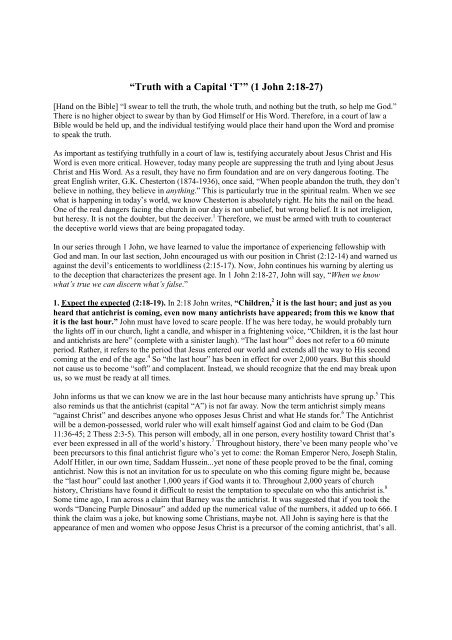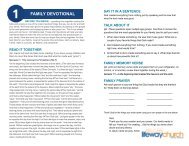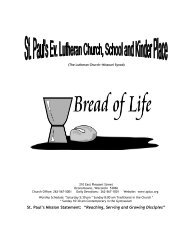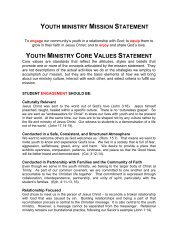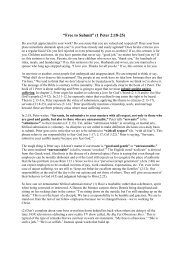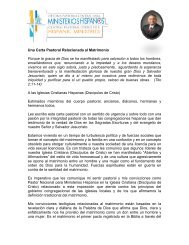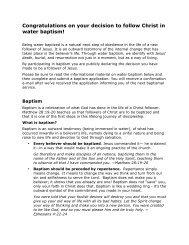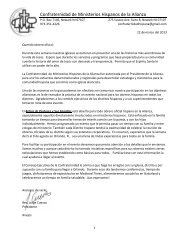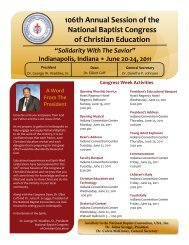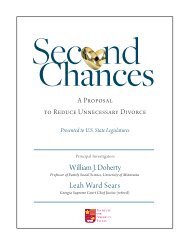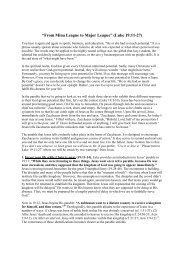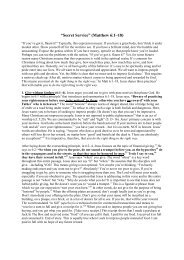“Truth with a Capital 'T'” (1 John 2:18-27) - Razorplanet
“Truth with a Capital 'T'” (1 John 2:18-27) - Razorplanet
“Truth with a Capital 'T'” (1 John 2:18-27) - Razorplanet
Create successful ePaper yourself
Turn your PDF publications into a flip-book with our unique Google optimized e-Paper software.
<strong>“Truth</strong> <strong>with</strong> a <strong>Capital</strong> ‘T’” (1 <strong>John</strong> 2:<strong>18</strong>-<strong>27</strong>)<br />
[Hand on the Bible] “I swear to tell the truth, the whole truth, and nothing but the truth, so help me God.”<br />
There is no higher object to swear by than by God Himself or His Word. Therefore, in a court of law a<br />
Bible would be held up, and the individual testifying would place their hand upon the Word and promise<br />
to speak the truth.<br />
As important as testifying truthfully in a court of law is, testifying accurately about Jesus Christ and His<br />
Word is even more critical. However, today many people are suppressing the truth and lying about Jesus<br />
Christ and His Word. As a result, they have no firm foundation and are on very dangerous footing. The<br />
great English writer, G.K. Chesterton (<strong>18</strong>74-1936), once said, “When people abandon the truth, they don’t<br />
believe in nothing, they believe in anything.” This is particularly true in the spiritual realm. When we see<br />
what is happening in today’s world, we know Chesterton is absolutely right. He hits the nail on the head.<br />
One of the real dangers facing the church in our day is not unbelief, but wrong belief. It is not irreligion,<br />
but heresy. It is not the doubter, but the deceiver. 1 Therefore, we must be armed <strong>with</strong> truth to counteract<br />
the deceptive world views that are being propagated today.<br />
In our series through 1 <strong>John</strong>, we have learned to value the importance of experiencing fellowship <strong>with</strong><br />
God and man. In our last section, <strong>John</strong> encouraged us <strong>with</strong> our position in Christ (2:12-14) and warned us<br />
against the devil’s enticements to worldliness (2:15-17). Now, <strong>John</strong> continues his warning by alerting us<br />
to the deception that characterizes the present age. In 1 <strong>John</strong> 2:<strong>18</strong>-<strong>27</strong>, <strong>John</strong> will say, “When we know<br />
what’s true we can discern what’s false.”<br />
1. Expect the expected (2:<strong>18</strong>-19). In 2:<strong>18</strong> <strong>John</strong> writes, “Children, 2 it is the last hour; and just as you<br />
heard that antichrist is coming, even now many antichrists have appeared; from this we know that<br />
it is the last hour.” <strong>John</strong> must have loved to scare people. If he was here today, he would probably turn<br />
the lights off in our church, light a candle, and whisper in a frightening voice, “Children, it is the last hour<br />
and antichrists are here” (complete <strong>with</strong> a sinister laugh). “The last hour” 3 does not refer to a 60 minute<br />
period. Rather, it refers to the period that Jesus entered our world and extends all the way to His second<br />
coming at the end of the age. 4 So “the last hour” has been in effect for over 2,000 years. But this should<br />
not cause us to become “soft” and complacent. Instead, we should recognize that the end may break upon<br />
us, so we must be ready at all times.<br />
<strong>John</strong> informs us that we can know we are in the last hour because many antichrists have sprung up. 5 This<br />
also reminds us that the antichrist (capital “A”) is not far away. Now the term antichrist simply means<br />
“against Christ” and describes anyone who opposes Jesus Christ and what He stands for. 6 The Antichrist<br />
will be a demon-possessed, world ruler who will exalt himself against God and claim to be God (Dan<br />
11:36-45; 2 Thess 2:3-5). This person will embody, all in one person, every hostility toward Christ that’s<br />
ever been expressed in all of the world’s history. 7 Throughout history, there’ve been many people who’ve<br />
been precursors to this final antichrist figure who’s yet to come: the Roman Emperor Nero, Joseph Stalin,<br />
Adolf Hitler, in our own time, Saddam Hussein...yet none of these people proved to be the final, coming<br />
antichrist. Now this is not an invitation for us to speculate on who this coming figure might be, because<br />
the “last hour” could last another 1,000 years if God wants it to. Throughout 2,000 years of church<br />
history, Christians have found it difficult to resist the temptation to speculate on who this antichrist is. 8<br />
Some time ago, I ran across a claim that Barney was the antichrist. It was suggested that if you took the<br />
words “Dancing Purple Dinosaur” and added up the numerical value of the numbers, it added up to 666. I<br />
think the claim was a joke, but knowing some Christians, maybe not. All <strong>John</strong> is saying here is that the<br />
appearance of men and women who oppose Jesus Christ is a precursor of the coming antichrist, that’s all.
In 2:19, <strong>John</strong> writes that these antichrists “went out from us [the apostolic circle, cf. 1:1-5; 4:6], 9 but<br />
they were not really of us; for if they had been of us, they would have remained 10 <strong>with</strong> us; but they<br />
went out, so that it would be shown that they all are not of us.” These false teachers had gone out<br />
from among the apostles, not that they were apostles themselves, claiming that their message was what<br />
the apostles endorsed (cf. Acts 15:1; 2 Cor 11:5). However, apparently they never believed in Christ as<br />
their Savior (cf. Gal 2:4, “false brethren secretly brought in”). Or, it is possible that these false teachers<br />
were genuine believers, <strong>with</strong> an uninformed faith in Jesus. 11 When <strong>John</strong> writes that these false teachers<br />
were “not really of us,” he could be saying they did not have apostolic fellowship.<br />
Regardless, there will be many from <strong>with</strong>in the church who will fail to persevere. It is important to<br />
recognize that Christian perseverance is normal but not inevitable. There are many Christians in the Bible<br />
who failed to persevere. Jesus and the biblical writers predict that there will be many more in the future<br />
that will fall away from the faith. Fortunately, our salvation is not based upon our perseverance; it is<br />
based upon God’s preservation. But don’t let that keep you from persevering. The rewards are great for<br />
the one that perseveres. Sadly, the loss is also great to the one who fails to persevere!<br />
The antichrists that left the apostolic circle and invaded the church are against Christ when they refuse to<br />
submit to the apostles and the church. The church is called “the body of Christ” and “the bride of Christ,”<br />
therefore it is crucial that we not mess <strong>with</strong> this entity. 12 Whether a false teacher is a Christian or not, the<br />
end result is brutal: divine discipline for the believer; eternal punishment for the unbeliever.<br />
When I was pastoring in Corvallis, OR, the Jesus Seminar took hold of Oregon State University. The<br />
leader of this movement was an OSU religion teacher. While I was living in Corvallis, I watched an<br />
interview <strong>with</strong> this man in which he claimed to have been an evangelical. He explained that he grew up in<br />
a Christian church and believed the Bible as the literal Word of God. But then he went off to a liberal<br />
seminary and discovered that the Bible was full of errors—one of them being that Jesus was not the literal<br />
and resurrected Son of God.<br />
Now, I do not claim to know for certain where this man will spend eternity. If I had to guess, I would<br />
suggest that he never understood or believed the simple gospel message and is therefore eternally lost. If<br />
perchance he did indeed trust in Christ, then I would expect God to chasten him severely in this life and in<br />
the next. My job is not to determine the eternal destiny of false teaches; my job is to keep us from falling<br />
prey to them. We must expect false teachers to raise up. We also need to be aware of their teachings and<br />
counteract them. We then need to expound cardinal truth: Jesus is the Christ!<br />
But before we move on, we must understand this: The greatest threat to the church today is not from the<br />
secular world; it is from <strong>with</strong>in the church! (2 Cor 11:13-15; 2 Tim 4:2-4) While many of us have been<br />
concerned about political parties and liberal media, our primary concern should be <strong>with</strong> the church.<br />
Where do cults come from? The church! Where do cults get their followers? The church!<br />
False teachers like Jim Jones and Joseph Smith left Christian fellowships in order to establish cults. What<br />
makes men like this so dangerous is they have knowledge of the feelings of Christians; they know the<br />
lingo and can play on our emotions. So they are among the most dangerous. They will say, “I used to feel<br />
the way you do and have the same beliefs you do. I understand exactly how you feel in your infancy, but<br />
now I’ve moved on to something more profound. I’ve advanced; I’m now on the cutting edge.” Precisely<br />
because they can identify <strong>with</strong> some of the things that you and I care about, they are more able to deceive.<br />
If you don’t believe that cults are effective at deceiving Christians just check the rolls of the Mormons<br />
and the Jehovah’s Witnesses. I myself know men and women who are genuine believers who have been<br />
deceived into adopting false teaching. No one is immune from this threat. That’s why the writers of<br />
Scripture attack it in 24 of the <strong>27</strong> New Testament books.
[If we are to reject false teaching, we must expect the expected. <strong>John</strong> also goes on to tell us to…]<br />
2. Keep the faith (2:20-23). <strong>John</strong> warned his readers of the danger to their intimate fellowship <strong>with</strong> God<br />
that the teaching of those who denied that Jesus is the Christ posed. If they rejected the Son, they could<br />
not expect an intimate relationship <strong>with</strong> the Father. In 2:20 <strong>John</strong> writes, “But you 13 have an anointing 14<br />
from the Holy One, and you all know.” 15 In contrast to the antichrists (2:19), faithful believers were<br />
“keeping the faith.” <strong>John</strong> even says that they have an “anointing.” If I had a dollar for every time I have<br />
heard this word used, I would be a rich man. If you turn on Christian television you will hear that so and<br />
so has “an anointing” or is “anointed.” The term has been abused.<br />
I have a confession to share <strong>with</strong> you. I have always had a bit of an addiction to Christian TV.<br />
Unfortunately, I don’t watch it for any real spiritual benefit. Rather, I am fascinated by the entertainment.<br />
It’s like watching an episode of The Gong Show. Lori gets very angry every time I watch it because we<br />
believe that much of the preaching is heretical. Well, if you watch TBN or Daystar for any length of time,<br />
you will see an “anointed” preacher carrying a handheld mic, using a hanky to wipe his brow, running<br />
around whacking people on the forehead. This is how the “anointing” is distributed. Now it’s unlikely<br />
that I will ever use a sweat cloth or handheld mic, but I’ll be glad to whack you on the forehead if you’d<br />
like.☺ Every time I watch “Christian” television, Lori wants to whack me upside the head. She doesn’t<br />
want our children hearing false teaching and she believes that much of it is blasphemous. I tend to agree.<br />
Anyway, the word for anointing (chrisma) is used only here in the New Testament. It speaks of a special<br />
enablement which comes from the Holy Spirit to discern spiritual truth from error (<strong>John</strong> 14:26; 16:13). 16<br />
The moment a person believes in Christ he or she is given this “anointing.” 17 This is why <strong>John</strong> can say,<br />
“you all know.” <strong>18</strong> Contextually, <strong>John</strong> is saying that believers know everything they need to know to<br />
counteract false teachers. 19 The reason being: we have a built-in Bible teacher—an “anointing.”<br />
<strong>John</strong> continues his argument in 2:21: “I have not written to you because you do not know the truth,<br />
but because you do know it, and because no lie is of the truth.” <strong>John</strong> has great confidence in his<br />
readers. He tells them that they “know” the truth. The word for “knowledge” (oida) here almost always<br />
refers to “direct insight” into spiritual or divine truth, although this truth may not yet have been<br />
experienced. 20 This truth is the result of the teaching and convicting ministry of the Holy Spirit. <strong>John</strong>’s<br />
entire point is: you cannot discern error unless you first know the truth.<br />
In 2:22-23 <strong>John</strong> writes, “Who is the liar but the one who denies that Jesus is the Christ? This is the<br />
antichrist, the one who denies the Father and the Son. Whoever denies the Son does not have the<br />
Father; the one who confesses the Son has the Father also.” It is important to note that <strong>John</strong> does not<br />
say that such a person is “a liar.” He calls such a person “the liar.” He does this because to misunderstand<br />
the identity of Jesus is the arch lie! 21 The antichrists lie because they deny that Jesus is the Christ, God’s<br />
Son, and our Savior (cf. <strong>John</strong> 11:25-<strong>27</strong>). This would have been the position of Jews who rejected Jesus as<br />
the Messiah and other false teachers to whom <strong>John</strong> alluded elsewhere. 22 These false teachers all claimed<br />
to have the truth from God. 23 However, <strong>John</strong> pointed out that since the Son and the Father are one, a<br />
person cannot deny the Son <strong>with</strong>out denying the Father as well (cf. Matt 10:32-33; Mark 8:38; <strong>John</strong><br />
12:44-45; 14:10-11). 24<br />
Let me be very clear: A person cannot worship God while denying Jesus’ full deity and full humanity.<br />
There is no relationship <strong>with</strong> God that bypasses Christ. If you don’t have the Son, forget the Father. The<br />
true God is the God and Father of our Lord Jesus Christ. If you don’t have Jesus you don’t have the<br />
Father, no matter how committed you are to God. 25 The truth about Christ is the test of all religions. 26 We<br />
cannot get to God unless we go through Jesus. Jesus said, “I am the way, and the truth, and the life; no<br />
one comes to the Father but through Me” (<strong>John</strong> 14:6). Everything in your Christian life must be measured<br />
by your fellowship <strong>with</strong> Jesus Christ. Jesus Christ is a nonnegotiable.
Of course, in today’s day and age many people will say I am preaching Christian hate, not love. They will<br />
argue, “We need tolerance and love.” Wait a minute. I believe we should love all unbelievers. But I also<br />
believe in loving God’s children. And I love my physical children. If I say to them, “Stay away from drug<br />
dealers,” does that mean I hate drug dealers? No. It means I love my children. Drug dealers can destroy<br />
their lives. And peddlers of false doctrine can destroy Christian lives.<br />
This means that there comes a time when we must sacrifice unity for the sake of the truth. Sometimes<br />
right belief is more important than cohesion and oneness. Unity is not the ultimate virtue in the Christian<br />
faith. <strong>John</strong> here is a coconspirator in the splitting of his church because he has stood firm in the truth.<br />
Certainly he mourned for these people, but he did not regret his decision. <strong>27</strong> Likewise, we must stand<br />
strong when it comes to cardinal truths about Jesus.<br />
[If we are to reject false teaching, we must expect the expected and keep the faith. Lastly, we must…]<br />
3. Learn the Word (2:24-<strong>27</strong>). In 2:24-25 <strong>John</strong> writes, “As for you, let that abide in you which you<br />
heard from the beginning [i.e., the teaching of the apostles, especially their teaching on the core issue of<br />
the gospel]. If what you heard from the beginning abides in you, you also will abide in the Son and<br />
in the Father. This is the promise 28 which He Himself [Jesus Christ] made to us: eternal life.” Three<br />
times in 2:24 <strong>John</strong> mentions the term “abide.” <strong>John</strong> now calls his readers to abide in the true doctrine of<br />
Jesus Christ to enable them to abide in fellowship <strong>with</strong> God. Such faithfulness enables us to continue to<br />
abide in fellowship <strong>with</strong> God. Again, abiding refers to remaining or continuing in intimate fellowship<br />
<strong>with</strong> God.<br />
A great analogy is marriage. If you are married, everything that you needed in marriage you were given at<br />
the wedding ceremony. You promised that you would share the rest of your life <strong>with</strong> your spouse, for<br />
better or worse, till death do you part. The initial commitment was all that was required. Then you were<br />
called to remain or to continue in these vows. Our problem in marriage is that we stop abiding. We stop<br />
dwelling in intimacy <strong>with</strong> each other. We stop honoring our vows—in sickness and in health. In the same<br />
way, abiding in Christ requires perseverance and commitment.<br />
In 2:25, <strong>John</strong> speaks of the “eternal life,” which results from an abiding relationship <strong>with</strong> Jesus. Eternal<br />
life is not speaking of deliverance from hell; rather, it refers to the very life of God, experienced on earth<br />
(cf. 1 Tim 6:12). Eternal life is not restricted to the there and then; it is something we can enjoy in the<br />
here and now. It happens on day one, when the Holy Spirit comes to live <strong>with</strong>in us.<br />
In 2:26-<strong>27</strong>, <strong>John</strong> concludes his attack on false teachers <strong>with</strong> a warning and a word of encouragement for<br />
his readers. 29 In 2:26 he writes, “These things [2:<strong>18</strong>-25] 30 I have written to you concerning those who<br />
are trying to deceive you.” <strong>John</strong> acknowledges that it is possible for believers to be deceived by false<br />
teaching. If it were not possible, <strong>John</strong> and the other biblical writers would not have spent so much time<br />
warning us. <strong>John</strong> does not want us to be led astray. He wants us to walk in truth. There are several ways<br />
that we can accomplish this:<br />
1. Recognize God’s sovereignty in divisions. While divisions <strong>with</strong>in Christendom create obvious<br />
problems, God causes some good to come out of them by using these divisions to clarify doctrinal<br />
differences and deviations from the truth.<br />
2. Prioritize the top three most compromised beliefs: (1) The gospel; (2) the authority of Scripture;<br />
and (3) the doctrine of sin. The devil’s primary work is to attack God’s Word; and these are the<br />
doctrines that the cults and world religions focus upon. This is how you can judge the validity of<br />
other world views.
3. Build a strong eschatological base. Eschatology simply means “the study of last things.” This is<br />
why I taught through the book of Revelation so early in my tenure. So much false teaching<br />
centers on Eschatology. If we don’t have a biblical understanding of the future we may fall prey<br />
to false teaching.<br />
4. Balance the extremes in Pneumatology (i.e., the study of the Holy Spirit). Some Christians are<br />
charismatic; some are not. However, we must all be balanced. The role of the Holy Spirit is to<br />
glorify Jesus, not to attract attention to Himself.<br />
5. Share fellowship <strong>with</strong> the right individuals. Many of us hang out <strong>with</strong> people who claim to be<br />
Christians who are terrible influences on our lives. We must seek to learn the Word so that we<br />
can hold our own <strong>with</strong> anyone at anytime.<br />
In 2:<strong>27</strong>, <strong>John</strong> closes this passage <strong>with</strong> these parting words: “As for you, the anointing which you<br />
received from Him abides in you, and you have no need for anyone to teach you; but as His<br />
anointing teaches you about all things, and is true and is not a lie, and just as it has taught you, you<br />
abide in Him.” In this one verse, <strong>John</strong> uses the word “you” eight times. This is very unusual. <strong>John</strong> is<br />
making his point <strong>with</strong> great emphasis! He wants his readers to understand that they possess the Holy<br />
Spirit, and He is more than able to help them keep the course in the midst of false teaching. Again, the<br />
“anointing” is the discernment of the Holy Spirit (cf. 2:20). The readers had <strong>with</strong>in them the Holy Spirit,<br />
whose ministry it is to guide believers into all truth and to teach them what God has revealed.<br />
Consequently, they were not dependent upon other human teachers, especially the false teachers.<br />
From this verse, some Christians have concluded that we should not listen to any human teacher. That is<br />
not what <strong>John</strong> said. He wanted his readers to remember that the Holy Spirit was the teacher, the ultimate<br />
source of illumination. He did not rule out secondary teachers through whom the Holy Spirit works in<br />
teaching. If that had been his view, he would not have written this epistle in which he taught his readers.<br />
His point was that we should not look to other human beings as the ultimate source of our learning, an<br />
attitude the false teachers were encouraging. 31 Of course the Holy Spirit uses the Word of God to teach us<br />
(<strong>John</strong> 16:14-15). <strong>John</strong> was not saying we can discard our Bibles. Since immature believers need human<br />
teachers (Heb 5:12), though they are not completely dependent on them, <strong>John</strong>’s readers appear to have<br />
been mature in the faith. 32 God has given human teachers as a gift to His church (Eph 4:11; 1 Cor 12:28;<br />
cf. Rom 12:7). <strong>John</strong>’s point is that we do not need to look to human teachers as our ultimate source of<br />
learning.<br />
But you may be saying, “I’m not sure I can understand the Scriptures. I don’t know Hebrew and Greek.<br />
I’ve never been to Bible college or seminary.” <strong>John</strong> wants us to ask the Holy Spirit to teach us. He wants<br />
each one of us to understand the Bible. He doesn’t want us to be dependent upon any one person. God<br />
wants us to understand the Scriptures even more than we want to understand them. It’s not about IQ.<br />
What you need is humility and a love for Jesus. This accomplishes more than any seminary degree or IQ.<br />
The same Spirit that raised Jesus from the dead will give you the power to interpret God’s Word. We<br />
can’t follow teachers; we must follow God’s Word. As much as I want you to benefit from my teaching, I<br />
don’t ever want you to be dependent upon my teaching. That would result in laziness. Instead, I want you<br />
to be dependent upon the Holy Spirit. So…<br />
• Bring your Bible to church. Make sure your wife brings her Bible to church. Help your children<br />
bring their Bible to church. My goal is to help you “learn the Word.” I want you to check what I<br />
preach <strong>with</strong> the Word (Acts 17:11).<br />
• Pray for divine guidance and wisdom when you study the Bible. Whenever I study or preach, I<br />
like to say, “I believe in the Holy Spirit.” This reminds me of the power source and the Person<br />
who lives <strong>with</strong>in me.
The March, 2006, issue of Reader’s Digest features a cover story on ten money scams to beware of. It<br />
seems that the Internet and other modern technologies have opened many doors of opportunity for con-<br />
artists who are after our money. To avoid being ripped off we must stay alert. It’s traumatic when thieves<br />
steal our identity and our money, but there is something far more traumatic and tragic, namely, when<br />
spiritual con-artists deceive the unsuspecting. The stakes are much higher than someone’s life savings.<br />
If you are a Christian, don’t be deceived or you will be disciplined by God and severely rebuked at the<br />
judgment seat of Christ. Furthermore, you will be held responsible for leading people astray. If you are an<br />
unbeliever, the eternal destiny of your soul is at risk! To avoid spiritual deception, we must develop<br />
biblical discernment and be vigilant at all times. May we know what’s true so that we can discern what’s<br />
false.”<br />
Copyright © 2006 Keith R. Krell. All rights reserved. All Scripture quotations, unless indicated, are taken from the New American Standard<br />
Bible, © 1960, 1962, 1963, 1968, 1971, 1972, 1975, 1977, and 1995 by The Lockman Foundation, and are used by permission.<br />
Permissions: Feel free to reproduce and distribute any articles written by Keith Krell, in part or in whole, in any format, provided that you do not<br />
alter the wording in any way or charge a fee beyond the cost of reproduction. It is our desire to spread this information, not protect or restrict it.<br />
Please include the following statement on any distributed copy: by Keith Krell, Timeless Word Ministries, 2508 State Ave NE Olympia, WA<br />
98506, 360-352-9044, www.timelessword.com
Scripture Reading<br />
1 <strong>John</strong> 2:<strong>18</strong>-<strong>27</strong><br />
Matthew 7:1-5<br />
Matthew 24:5, 24<br />
<strong>John</strong> 14:26<br />
Acts 20:30<br />
2 Thessalonians 2:1-12<br />
Titus 1:9<br />
Study Questions<br />
1. <strong>John</strong> warns us that “antichrists” are popping up all over the place (2:<strong>18</strong>-19). This reality could lead Christians to<br />
become paranoid. What is the difference (if any) between being discerning and being distrustful? Is it wrong to<br />
be distrustful of someone? Why or why not? How can I develop discernment <strong>with</strong>out becoming skeptical of<br />
everyone and everything?<br />
2. Do I know the Bible well enough to recognize false doctrine when I hear it? Read Romans 16:17 and 1 Timothy<br />
4:16. Do I consistently test what I hear by the Bible? Read Acts 17:11; 1 Thessalonians 5:20-22; 1 <strong>John</strong> 4:1; and<br />
Revelation 2:2-3. What plan will I write up to ensure that I am more biblically literate and prepared to guard<br />
myself against false teachers?<br />
3. Since there are so many views of different doctrines, how can I know that I am right? How can I hold to a<br />
biblically correct view <strong>with</strong>out becoming arrogant? How do I determine which doctrines are core doctrines<br />
worth dividing over, and which are more peripheral (i.e., non-essential)? The Bible commands us not to judge<br />
others (Matthew 7:1). How does this square <strong>with</strong> “refuting those who contradict” (Titus 1:9)?<br />
4. <strong>John</strong> and the biblical writers emphasize the importance of persevering in our faith. How important is<br />
perseverance to me? Do I reflect on my personal perseverance? Read Proverbs 24:10; 1 Corinthians 9:24-<strong>27</strong>; 1<br />
Timothy 1:<strong>18</strong>-20; 2 Timothy 4:6-8; and James 1:12. Am I currently standing strong in my faith? Read 1<br />
Corinthians 16:13; Ephesians 6:14; and 2 Thessalonians 2:15. What one area is keeping me from being wholly<br />
devoted to Christ? How can I develop greater “staying power?” Who can I call upon to help me in this pursuit?<br />
5. <strong>John</strong> informs us that the Holy Spirit is our ultimate teacher (2:20, <strong>27</strong>). Do I honestly believe that I am capable of<br />
understanding the Scriptures for myself (2:<strong>27</strong>; 1 Cor 2:6-16; 2 Cor 2:15-<strong>18</strong>; <strong>John</strong> 16:13)? Will I begin to strive<br />
to read God’s Word and study to show myself approved (2 Timothy 2:15; 3:17)? How will I go about this? Do I<br />
have a plan or a goal? Who will I share this <strong>with</strong>?
Notes<br />
1<br />
Sam Gordon, Living in the Light: 1.2.3 <strong>John</strong> (Greenville, SC: Trans World Radio, 2001), 85.<br />
2<br />
<strong>John</strong> probably used a different Greek word translated “children” (paidia, also in 2:12) because it implies a child<br />
who learns. His readers needed to learn what he now revealed.<br />
3<br />
Technically, the Greek phrase eschate hora (“last hour”) is <strong>with</strong>out an article in front of it. It can reasonably be<br />
translated “the last hour,” but it can also reasonably be translated “a last hour,” and in this case the latter is better.<br />
<strong>John</strong> is referring to an era of time not a specific period of time.<br />
4<br />
The term “last hour” occurs only here in the NT. However, the biblical authors also use expressions like “last<br />
days” and “last times” to describe this same period (see Joel 2:28; Mic 4:1; Acts 2:17; 1 Tim 4:1; 2 Tim 3:1; Heb<br />
1:2; 2 Pet 3:3; Jude 17-<strong>18</strong>).<br />
5<br />
From other references to “antichrists” in this letter it is evident that when the writer uses this term he means the<br />
heterodox ex-members of his own community: those who, in one way or another, were denying the true identity of<br />
Jesus, and the fact of God’s saving activity mediated to the world through him. Stephen S. Smalley, 1, 2, 3 <strong>John</strong>:<br />
WBC (Waco: Word, 1984), 101.<br />
6<br />
The antichrists are those who oppose Jesus Christ and His teachings, not just people who profess to be the<br />
Messiah. <strong>John</strong> R. W. Stott, The Epistles of <strong>John</strong>: TNTC (Grand Rapids: Eerdmans, 1964), 104-105.<br />
7<br />
Jesus will destroy the Antichrist when He returns at the second coming (2 Thess 2:9, Rev. 19:20).<br />
8<br />
Just since 1945 the list of people that Christians have claimed were the antichrist includes Pope Pious XII, <strong>John</strong> F.<br />
Kennedy, Henry Kissinger, Anwar Sadat, Jimmy Carter, Ronald Reagan, Pat Robertson, King Juan Carlos of Spain,<br />
Rev. Sun Myung Moon, and Mikhail Gorbachev. See Richard Kyle, The Last Days Are Here Again (Grand Rapids:<br />
Baker, 1998), 131-32.<br />
9<br />
The term “us” (humon) probably does not refer to the Christian community at large. If these revisionists had left<br />
the churches, they would not have been a problem for <strong>John</strong>’s readers. The physical separation of these men from the<br />
apostles and the faithful eventually illustrated their doctrinal separation from them.<br />
10<br />
The verb meno (“remain/abide”) occurs 112 times in the NT (66 times by <strong>John</strong>, 23 times in this letter).<br />
11<br />
Smalley, 1, 2, 3 <strong>John</strong>, 103. Cf. Zane C. Hodges, The Epistles of <strong>John</strong>: Walking in the Light of God’s Love (Irving,<br />
TX: Grace Evangelical Society, 1999), 109-110.<br />
12<br />
In 1 Cor 3:17, Paul writes, “If any man destroys the temple of God, God will destroy him, for the temple of God is<br />
holy, and that is what you are.”<br />
13 In the Greek text, the word “you” (humeis) is emphatic.<br />
14 The false teachers may have been using the word “anointing” as a technical term for being initiated into their<br />
special gnosis, or knowledge. Stott, The Epistles of <strong>John</strong> The Epistles of <strong>John</strong>, 107.<br />
15 There is a play on words here in Greek. If the secessionists represent the antichrist (antichristos), now we learn<br />
that <strong>John</strong>’s Christians bear an anointing (chrisma) that can aid and protect them. Antichristos and chrisma originate<br />
from the same Greek verb, chrio, “to anoint.” Gary M. Burge, The Letters of <strong>John</strong>: NIV Application Commentary<br />
(Grand Rapids: Zondervan, 1996), 128.<br />
16 This seems preferable to the idea that the Word of God is the anointing. See C. H. Dodd, The Johanine Epistles:<br />
Moffatt New Testament Commentary series (New York: Harper and Row, 1946), 63. Marshall, The Epistles of <strong>John</strong>,<br />
155, proposed a similar view, namely, that the Word applied by the Spirit constitutes the anointing, which Smalley,<br />
1, 2, 3 <strong>John</strong>, 106-7, followed.<br />
17 See Rom 8:9; 1 Cor 12:13; cf. Luke 4:<strong>18</strong>; <strong>John</strong> 6:69; 14:17, 26; 15:26; 16:13; Acts 10:38; 2 Cor 1:21-22; cf. Luke<br />
4:<strong>18</strong>; Acts 4:<strong>27</strong>; 10:38.<br />
<strong>18</strong> The NKJV and KJV render this “you know all things,” but this can be a bit confusing since only God knows all<br />
things.<br />
19 Naturally, some Christians have more perception than others due to God-given ability, satanic blindness, the<br />
influence of human teachers, sin in the life, etc.<br />
20 This is the second use of oida (the first was in 2:11), a word that <strong>John</strong> now uses 14 more times in the rest of the<br />
letter. It does not refer to experiential knowledge as does ginosko (2:3-4, 12-14).<br />
21 Michael Eaton, 1.2.3 <strong>John</strong>: Focus on the Bible (Scotland: Christian Focus, 1996), 80.<br />
22 Among these were the Gnostics who believed that anything material was sinful and therefore Jesus could not have<br />
been God’s Son. Docetists taught that Jesus was not truly a man and therefore not our Savior. Followers of<br />
Cerinthus believed that Jesus was not fully God but that God only came upon Him at His baptism and departed from<br />
Him before His crucifixion. Glenn W. Barker, “1 <strong>John</strong>,” The Expositor’s Bible Commentary (Grand Rapids:<br />
Zondervan, 1981 [2001]), Electronic Ed.; Raymond Brown, The Epistles of <strong>John</strong>: Anchor Bible (Garden City, N.Y:<br />
Doubleday, 1982), 112.
23 These false teachers were denying that Jesus is the Christ. This probably was more than a denial that Jesus was the<br />
Old Testament Messiah. The context here, which refers to Jesus as the Son of God and which closely links the<br />
Father and the Son, indicates that these false teachers denied the full deity of Jesus Christ. They denied the<br />
incarnation that God took on human flesh in the virgin birth of Jesus. They taught that “the Christ” came upon the<br />
human Jesus at His baptism and departed at His crucifixion. <strong>John</strong> says that they denied both the Father and the Son.<br />
The modern cults all go astray on the person and work of Jesus Christ. They deny His deity and His substitutionary<br />
death on the cross. They deny the trinity. Some of them speak in Gnostic fashion of “the Christ <strong>with</strong>in us all.” By<br />
denying the Son of God, they do not have the Father. In the words of this apostle of love, they are liars, deceivers,<br />
and antichrists.<br />
24 Some readers have understood the first part of 1 <strong>John</strong> 2:23 to mean that it is impossible for a true Christian, one<br />
who “has the Father,” ever to deny the Son. This interpretation seems inconsistent <strong>with</strong> other Scripture (2 Tim 2:12)<br />
as well as human experience. Genuine Christians have denied Christ, to avoid martyrdom, for example. In the<br />
context <strong>John</strong> wrote about an abiding relationship <strong>with</strong> God, not just a saving relationship. So another explanation is<br />
that <strong>John</strong> meant that whoever denies the Son does not have the Father abiding in him. In this view, one who denies<br />
the Son does not have an abiding relationship <strong>with</strong> the Father. This describes all unbelievers and those believers who<br />
are not abiding in God. A third explanation is that <strong>John</strong> was describing what is typical: typically those having the<br />
Father do not deny the Son, though there may be a few exceptions. However the broad “whoever” in this verse<br />
seems to imply that what <strong>John</strong> wrote is true of all. I prefer view two. See also Dr. Thomas L. Constable, Notes on 1<br />
<strong>John</strong> (http://www.soniclight.com/constable/notes/pdf/1john.pdf, 2006), 28.<br />
25 The second part of 1 <strong>John</strong> 2:23 is the positive corollary to the first part. Confessing the Son is the opposite of<br />
denying Him. Confessing the Son results in the Father abiding in the confessor. Confessing the Son involves a<br />
public profession of faith in Him, not just exercising saving faith in Him (cf. Rom 10:9-10; 2 Cor 4:13).<br />
26 Let’s apply this lie detector test on Islam. What does Islam say about Jesus Christ? Is He the Son of God or not?<br />
WHO IS JESUS CHRIST?<br />
ISLAM CHRISTIANITY<br />
Not the Son of God; just a man The Son of God; equal to the Father<br />
Did not exist in any form before earth Has existed from eternity past<br />
Did not die on the cross Died in our place on the cross<br />
Did not rise from the grave Rose from the grave<br />
What does this passage say about any religious system that denies that Jesus Christ is the Son of God? Two things:<br />
1) It is a lie; 2) it is from the Antichrist. That’s another way of saying it is from the devil.<br />
<strong>27</strong><br />
Burge, The Letters of <strong>John</strong>, 141.<br />
28<br />
This is the only time <strong>John</strong> used the word “promise” (epangelia) in all his writings.<br />
29<br />
Barker, “1 <strong>John</strong>,” Electronic Ed.<br />
30<br />
The phrase “these things” (tauta egrapsa) refers to what <strong>John</strong> has just written in 2:<strong>18</strong>-25. This phrase is used<br />
throughout the book to refer to the immediately preceding context (cf. 1:4; 2:1; 5:13).<br />
31<br />
The false teachers appear to have claimed that God had inspired them, but He had not. <strong>John</strong> was warning his<br />
readers about false teachers who claimed revelation beyond what Jesus Christ and the apostles had taught. We need<br />
simply to abide in God and to respond to the Holy Spirit’s ministry to us (cf. <strong>John</strong> 15:4-7). <strong>John</strong>’s original readers<br />
were doing well in their walk <strong>with</strong> God. <strong>John</strong> began this section of his epistle (2:12-<strong>27</strong>) by affirming their healthful<br />
spiritual condition (2:12-14). He then warned them of their spiritual adversaries (2:15-<strong>27</strong>): the allurements of the<br />
world (2:15-17) and the enticements of false teachers (2:<strong>18</strong>-<strong>27</strong>).<br />
32<br />
There is a parallel between what <strong>John</strong> urged his readers to do in this section of his epistle and what Moses<br />
commanded the Israelites to do. In both cases the holiness of God demanded that those who came into the closest<br />
and most intimate contact <strong>with</strong> God, in the Tabernacle and in the church, be holy. Moses advocated renouncing sin,<br />
obeying God, rejecting worldliness, and keeping the faith in the “Covenant Code” (Exodus 20-23; 25-31), the<br />
“Priestly Code” (Exodus 35-Leviticus 16), and the “Holiness Code” (Lev 17:10-25:55). <strong>John</strong> similarly urged his<br />
readers to renounce sin (1:8-2:2), to obey God (2:3-11), to reject worldliness (2:12-17), and to keep the faith (2:<strong>18</strong>-<br />
<strong>27</strong>). In both cases the prophet’s concern was that those believers under their care would be holy as God is holy (Lev<br />
11:44-45; 19:2; 20:7; 1 Pet 1:15-16). Holiness is imperative for God’s people to “know,” “see,” and “have<br />
fellowship <strong>with</strong>” a holy God (cf. Heb 12:10-14). Constable, Notes on 1 <strong>John</strong>, 29-30.


